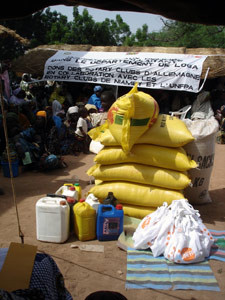News
New UNFPA Effort to Assist Women Suffering from Niger's Food Crisis
- 28 October 2005
News
NIAMEY, Niger — UNFPA, the United Nations Population Fund, launched a new initiative earlier this month to help the millions of pregnant and nursing women affected by the ongoing food crisis in Niger. The effort aims to improve the nutritional status of pregnant and nursing women. It also encourages these women to use reproductive health services, particularly that the use of such services remains low in Niger – at less that 30 per cent.

UNFPA has provided about $50,000 for the new effort, and helped raise more than $25,000 from Rotary International. It has also gathered materials, such as cereals, pulses and oil from the World Food Programme; iron and folic acid from the United Nations Children’s Fund; and Vitamin A from Helen Keller International. This UNFPA initiative is being implemented in cooperation with the Government's Food Crisis Management Unit and Rotary International in the Department of Loga, which includes Loga Urbain, Falwel and Sokorbé.
Each woman visiting a health centre for prenatal, delivery and post-natal care will receive 50 kilograms of cereals, 10 kilograms of pulses, and 5 kilograms of oil. She will also get a mosquito net to prevent malaria, which can cause severe anaemia in pregnant women and contribute to low birth weights among infants. Basic delivery kits, iron and vitamin A – for both mothers and infants – are also distributed to women admitted for delivery at health centres.
A similar intervention was launched last month in the regions of Zinder and Agadez and has succeeded in promoting the use of reproductive health services, including deliveries attended by qualified staff.
Niger already has one of the highest maternal death rates in the world. Its women have a 1 in 7 lifetime risk of dying of pregnancy-related causes. Making sure that pregnant and nursing women receive adequate nutrition with essential vitamins and minerals can reduce deaths among mothers and children, birth defects, blindness, anaemia and vulnerability to infections. Experts estimate that eliminating malnutrition in mothers can reduce disabilities in their infants by almost one third.
The United Nations estimates that 3.6 million people, out of a total population of 12 million, have been affected by the current crisis in Niger. Of those, 2.7 million are extremely vulnerable and require food assistance. Pregnant women and nursing mothers are among the groups considered most at risk, with more than 261,000 women in need of emergency care.
Contact Information:
Siân Evans, evans@unfpa.org